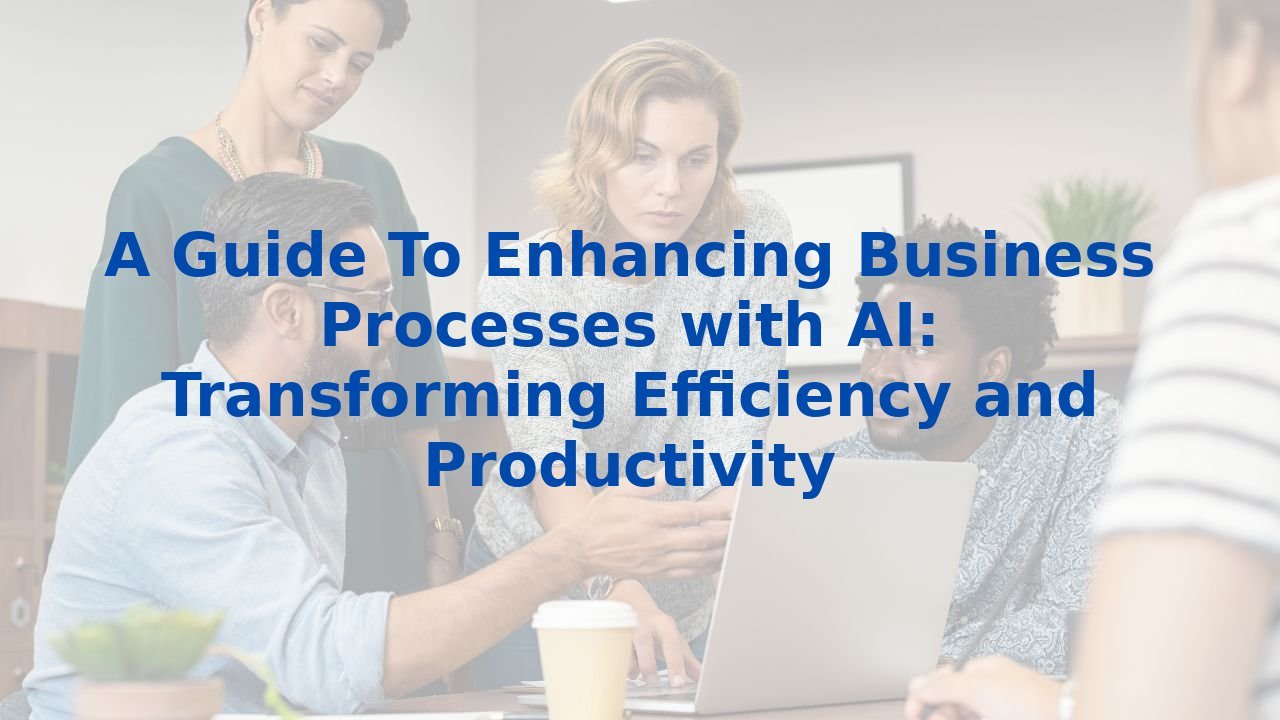A Guide To Enhancing Business Processes with AI: Transforming Efficiency and Productivity
A Guide To Enhancing Business Processes with AI: Transforming Efficiency and Productivity
In an era where every second counts, businesses are on a relentless quest to improve their efficiency and productivity. Artificial Intelligence (AI) is not just a futuristic concept; it is here and now, poised to revolutionize how organizations operate. By seamlessly integrating AI into business processes, companies can enhance their workflows, leading to substantial gains in performance, customer satisfaction, and ultimately, profitability.
1. Automating Repetitive Tasks
Let’s face it: every organization has its fair share of repetitive tasks. Data entry, invoicing, and customer inquiries are often time-consuming and drain valuable resources. Here’s where AI strides in, automating these mundane tasks and liberating your workforce. When these processes are streamlined, employees can redirect their energy towards complex problem-solving and strategic initiatives that truly drive growth.
2. Enhancing Customer Service
At the heart of any successful business lies its customer. AI is a game changer in enhancing customer service through personalized interactions that foster loyalty. Implementing chatbots and virtual assistants, which leverage natural language processing (NLP), empowers businesses to respond promptly to customer inquiries, making interactions smoother and more effective. Imagine the ease of addressing customer needs in real-time while providing insights derived from feedback and social media data. This capability not only improves customer experiences but also helps businesses in adapting quickly to market demands.
3. Optimizing Supply Chains
In a world where supply chain dynamics can shift in the blink of an eye, AI-based solutions are capable of analyzing vast amounts of data to optimize operations. By predicting demand and identifying bottlenecks, AI enhances operational effectiveness. Picture an AI system that monitors production lines in real time—detecting issues before they escalate and suggesting actionable improvements. This level of foresight enables organizations to respond proactively, thus maximizing production output and minimizing waste.
4. Improving Product Development
Product development often involves iterative design processes that can postpone market entry. However,AI is changing the landscape through generative design. By simply inputting specific goals and parameters, designers can unleash a range of potential designs generated by AI software. This not only accelerates the development cycle but also reduces dependency on costly prototypes, allowing companies to bring innovative products to market quicker and more efficiently.
5. Enhancing Sales and Marketing
When it comes to sales and marketing, AI acts as a compass, guiding teams to high-impact efforts. Through CRM analytics, AI delivers insights into customer behaviors and preferences, allowing sales forces to tailor their approaches effectively. The predictive ability of AI can help identify clients likely to yield the highest returns, ensuring that resources are allocated wisely. Moreover, AI-powered chatbots can facilitate sales too, offering immediate assistance and recommendations that enhance the purchasing journey.
6. Refining Recruitment
Recruitment processes often become bottlenecks—not anymore. AI can automate resume screening and candidate evaluations, giving HR teams the tools they need to identify top talent swiftly. Furthermore, AI offers predictive analysis on employee performance, paving the way for more informed hiring decisions. By reducing time spent in the recruitment phase, organizations can focus on what truly matters: nurturing talent and fostering growth.
Benefits of Training Employees for AI
While the integration of AI into business processes is transformative, the human element remains irreplaceable. Training employees to work alongside AI technologies is equally crucial—a factor that amplifies the returns on your AI investments. Here are several key benefits:
- Enhanced Collaboration: Employees equipped with AI skills can intelligently integrate these tools, fostering seamless collaboration across teams.
- Improved Decision Making: Comprehensive training allows employees to analyze data effectively, leading to better strategic outcomes.
- Adaptability: A workforce familiar with AI technologies can more readily adjust to changes, making transitions smoother.
- Increased Efficiency: When employees understand how to leverage AI, they can automate tasks more efficiently, thus liberating time for higher-value work.
Conclusion
Artificial Intelligence is reshaping the business landscape, driving process automation, enhancing customer service, optimizing supply chains, improving product development, and refining recruitment efforts. The benefits are clear: increased efficiency, better decision-making, and heightened customer satisfaction. However, to truly capitalize on these advancements, investing in employee training is non-negotiable. In a competitive environment, staying informed about AI’s capabilities ensures not just survival but leadership. Embrace AI, train your workforce, and watch your organization thrive.
If you're looking to equip your team with AI skills, consider exploring tailored training programs that cater to your organization’s unique needs. Check out various options for comprehensive AI training to future-proof your business and harness the power of AI.



